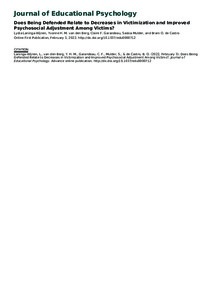Does Being Defended Relate to Decreases in Victimization and Improved Psychosocial Adjustment Among Victims?
Laninga-Wijnen Lydia; van den Berg Yvonne H. M.; Garandeau Claire F.; Mulder Saskia; de Castro Bram O.
https://urn.fi/URN:NBN:fi-fe2022081153931
Tiivistelmä
School bullying is a clear violation of children’s rights to a safe education and is a major concern among school professionals and parents. Many antibullying interventions focus on enhancing peer defending of victims to combat bullying and to promote victims’ psychosocial functioning. However, longitudinal studies on the effects of being defended on (a) diminishing victimization and (b) enhancing victims’ psychosocial adjustment are lacking, and the role of the broader peer context has been largely unexplored. Therefore, this study examined whether being defended decreases victimization and improves victims’ psychosocial adjustment, and whether defending peer norms moderate these effects. Data were derived from a nationwide Dutch study on the effectiveness of antibullying interventions, with N = 5,415 students (Mage = 9.93; 48.3% girls) from 238 classrooms (54.2% control classrooms) in 68 elementary schools. Findings indicate that victims with at least one defender at the start of the school year (Time 1) experienced higher feelings of belonging at the end of the school year (Time 2) compared with nondefended victims, but experienced lower feelings of belonging compared with nonvictims. Defended victims did not differ from nondefended victims in self-esteem, depressive symptoms, and severity of victimization at Time 2. Nonvictims were significantly better adjusted than defended and nondefended victims regarding these outcomes. Descriptive and popularity norms for defending did not moderate the links between being defended and victims’ adjustment and severity of victimization at Time 2. Thus, being defended only partly relieves victims’ plight, irrespective of how normative defending behaviors are in classrooms.
Kokoelmat
- Rinnakkaistallenteet [27094]
